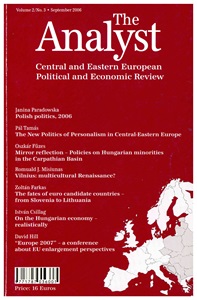The New Politics of Personalism in Central-Eastern Europe
The New Politics of Personalism in Central-Eastern Europe
Author(s): Pál TamásSubject(s): Politics / Political Sciences
Published by: Globális Tudás Alapítvány
Summary/Abstract: In the past few years, the style of politics in Central-Eastern Europe has changed radically. Various manifestations of political personalism have appeared. What does the term mean? Part of the phenomenon is the increasing role of authority within the party system, and the more prominent role of leading politicians during elections. There is a pre-eminence in decision-making of small groups of leaders – as small as one or two people – within the constitutional order. There are stronger ties between leaders and their devoted masses, whereas traditional political elections center around parties, programs or ideologies. The concept of personalism is often used more broadly, for instance to describe the growth of person-centered systems as found in Latin America, or to understand modes of rule that liquidate democratic elements, as found in Central Asia. When talking about personalism in Central Eastern Europe, I do not primarily think of some kind of semi-authoritarian order or a movement in that direction. The new leaders in the region use the constitutional systems and undertake no serious effort to change them. Moreover, we do not see charisma in the Central-East European politicians who embody this type of political style, even if small groups of devoted adherents perceive their leaders as charismatic. [...]
Journal: The Analyst - Central and Eastern European Review - English Edition
- Issue Year: 2006
- Issue No: 03
- Page Range: 35-54
- Page Count: 20
- Language: English

